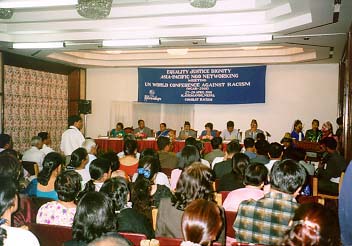- TOP
- 資料館
- FOCUS
- June 2001 - Volume 24
- From Kathmandu to Durban and Beyond
FOCUS June 2001 Volume 24
From Kathmandu to Durban and Beyond
Following the parallel NGO meeting during the inter-governmental regional preparatory meeting for the WCAR held in Tehran in February, Asia-Pacific NGOs met again from 27-29 April 2001 in Kathmandu. About 200 NGO representatives (including 50 Nepali NGO representatives) gathered to further strengthen the NGO declaration and recommendations prepared in Tehran, and discuss action plans and strategies toward Durban on various issues and themes related to the WCAR.
NGOs will lobby the output of this meeting in the second WCAR PrepCom to be held in Geneva in June. In this meeting, government representatives will make the final draft of the declaration and plans of action of WCAR.

The Kathmandu meeting had nine working groups for the following themes: 1) Engendering Racism, 2) Globalization and Racism, 3) Migrants Facing Racism and Xenophobia, 4) Trafficked Persons as Victims of Racism, 5) Rights of Indigenous Peoples, 6) Caste as Racial Discrimination on the Basis of Descent and Occupation, 7) Racist Treatment of Ethnic Minorities, 8) Religious Intolerance, and 9) Racist Treatment of Refugees. Each working group reviewed the Tehran NGO documents and suggested improvements.
Prior to the working group meetings, a public hearing was held. Victims of racism from a number of countries testified. There were testimonies by a trafficked Nepali woman, victims of caste discrimination in India, a representative of an ethnic minority from Aceh, Burmese refugees from Chin and Shan state, and an Indonesian woman who worked as a domestic helper in Hong Kong. Each testimony expressed the agony and anger suffered by the victims. Ms. Nimalka Fernando, the secretary of the Asia-Pacific NGO Coordinating Committee for WCAR, reminded the participants of the importance of hearing the voices of the victims of racism and related discrimination and bringing them to Durban.
A plenary session was devoted to the caste-based discrimination issue since it remains a contested issue in WCAR. There is still a major debate on whether or not it should be included in the WCAR agenda. The Indian government strongly opposes its inclusion in the agenda. The representatives of the Buraku movement in Japan, and the Dalit groups in Nepal and India appealed for the inclusion of the issue in the WCAR declaration, and plans of action. Dalit groups from India strongly condemned the stance of the Indian government, they insisted that the caste-based discrimination issue should be included in the WCAR agenda. The session emphasized the need for NGOs working on various issues to acknowledge the importance of discussion on caste-based discrimination. Their support for the movement against caste-discrimination was sought. The participants agreed to adopt the issue of caste-based discrimination as a primary issue of the Asia-Pacific NGOs.
Two plenary sessions were converted into "training sessions" (two 30-minute lectures) on lobbying and use of the media. These sessions were meant as preparatory exercises for the action planning sessions that followed.
The lecture on lobbying stressed the importance of planning for lobbying for each of the following stages: 1) Kathmandu to 2nd PrepCom, 2) 2nd PrepCom, 3) 2nd PrepCom to Durban, 4) Durban and 5) Beyond Durban. The lecture presented basic knowledge on lobbying including skills for preparing lobby documents, and other lobbying activities.
The lecture on the use of media presented various media strategies on campaigns and advocacy such as preparing information, building network, and training of media staff.
With the lectures as input, the nine working groups met again to discuss plans of action and strategies. A drafting committee consolidated the results of the working group discussions into one declaration. The draft declaration was presented in the plenary session for review. Participants raised suggestions on both contents and language of the document. The representatives of indigenous people's organizations however complained about the undemocratic declaration-drafting process. They presented their own document as an attachment to the draft declaration. Finally, the participants approved the WCAR Asia Pacific NGO Declaration (Tehran/Kathmandu) and the Kathmandu Action Plan: Kathmandu to Durban and Beyond as well as nine resolutions.
The Kathmandu documents are available in the website of the Asia-Pacific NGO Coordinating Committee (https://www.hurights.or.jp/wcarasia.htm).
Kazuhiro Kawamoto is a staff of HURIGHTS OSAKA
